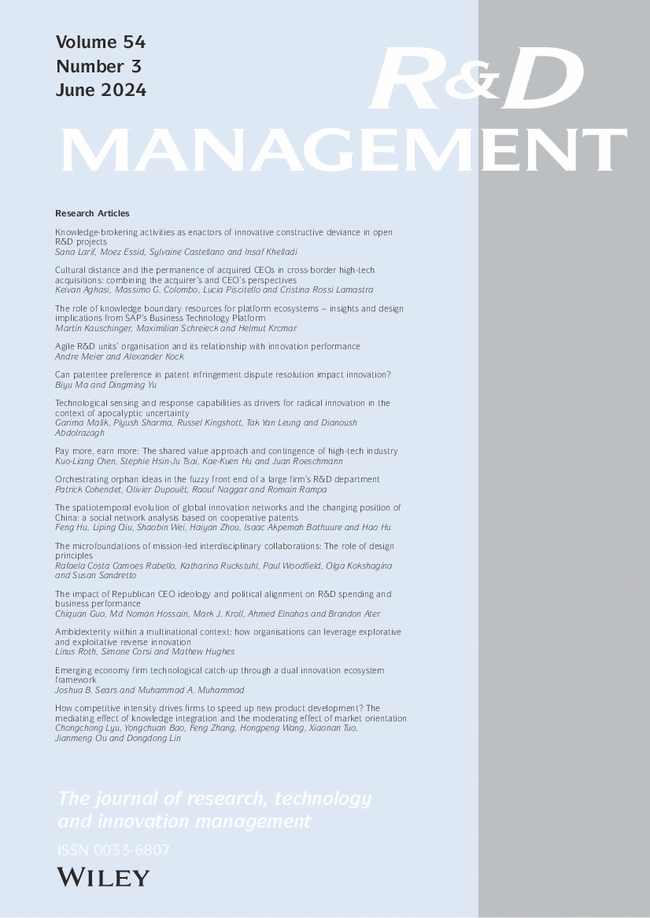How production cooperatives operating a sharing economy business model innovate in rural places
IF 5.7
2区 管理学
Q1 BUSINESS
引用次数: 0
Abstract
In this study, we investigate how production Cooperatives with a Sharing Economy Business Model (CSE‐BMs) foster innovations in structurally weak rural places. Taking a place‐based social capital perspective, we argue that the strength of CSE‐BMs in developing process, service, product, and social innovation lies in their ability to reconfigure shared resources across communities and actors located on different levels of power and with different access to resources. Empirically, we reconstruct the mobilization and reconfiguration of shared resources across the network in an in‐depth case study of a CSE‐BM in rural Greece. We find that CSE‐BMs can mobilize resources across the network by offering value propositions that stakeholders regard as credible because decision‐makers show attachment to the place. To realize sufficient value for members to sustain their contributions to the CSE‐BM, product, service, and process innovations are complemented by social innovations. Mobilizing and reconfiguring shared resources across different interest groups unleashes the innovative potential of CSE‐BMs but causes tensions between different mindsets at the same time. Cooperatives offer an organizational structure to turn these tensions from a threat into an opportunity for innovation. Our findings contribute to the Sharing Economy Business Model (SE‐BM) literature on typology building and the construction of ideal types. We also advance the SE‐BM debate by shedding light on the potential of cooperative forms of organizing collaborative production in the sharing economy. Practically, we contribute to the discussion about the importance of physical vs. digital platforms as intermediaries in SE‐BMs.运营共享经济商业模式的生产合作社如何在农村地区进行创新
在本研究中,我们调查了共享经济商业模式生产合作社(CSE-BMs)如何在结构薄弱的农村地区促进创新。从基于地方社会资本的视角出发,我们认为,共享经济商业模式生产合作社在发展流程、服务、产品和社会创新方面的优势在于,它们能够重新配置位于不同权力层级、拥有不同资源获取途径的社区和参与者之间的共享资源。通过对希腊农村地区 CSE-BM 的深入案例研究,我们从实证角度重新构建了整个网络的共享资源动员和重新配置。我们发现,CSE-BMs 可以通过提供利益相关者认为可信的价值主张来调动整个网络的资源,因为决策者对这个地方有感情。为了实现足够的价值,使成员能够持续为 CSE-BM 做出贡献,产品、服务和流程创新需要得到社会创新的补充。调动和重新配置不同利益群体的共享资源,可以释放 CSE-BM 的创新潜力,但同时也会造成不同思维方式之间的紧张关系。合作社提供了一种组织结构,可将这些紧张关系从威胁转化为创新机遇。我们的研究结果为共享经济商业模式(SE-BM)的类型学构建和理想类型构建文献做出了贡献。我们还通过揭示共享经济中组织协作生产的合作形式的潜力,推动了共享经济商业模式的讨论。在实践中,我们为关于实体平台与数字平台作为 SE-BM 中介的重要性的讨论做出了贡献。
本文章由计算机程序翻译,如有差异,请以英文原文为准。
求助全文
约1分钟内获得全文
求助全文
来源期刊

R&D Management
Multiple-
CiteScore
11.30
自引率
9.50%
发文量
0
期刊介绍:
R&D Management journal publishes articles which address the interests of both practising managers and academic researchers in research and development and innovation management. Covering the full range of topics in research, development, design and innovation, and related strategic and human resource issues - from exploratory science to commercial exploitation - articles also examine social, economic and environmental implications.
 求助内容:
求助内容: 应助结果提醒方式:
应助结果提醒方式:


